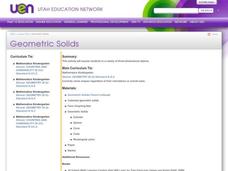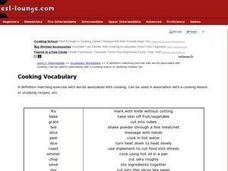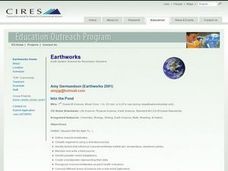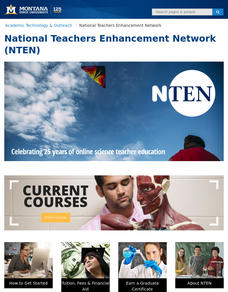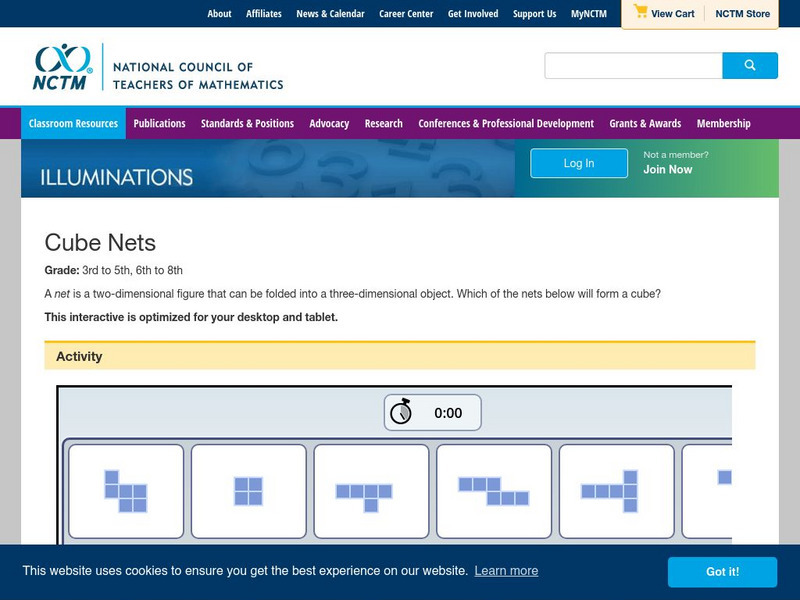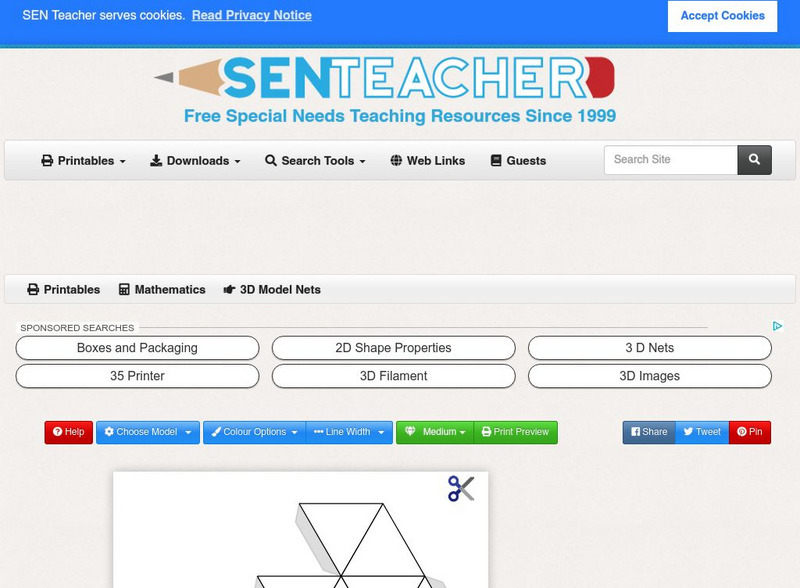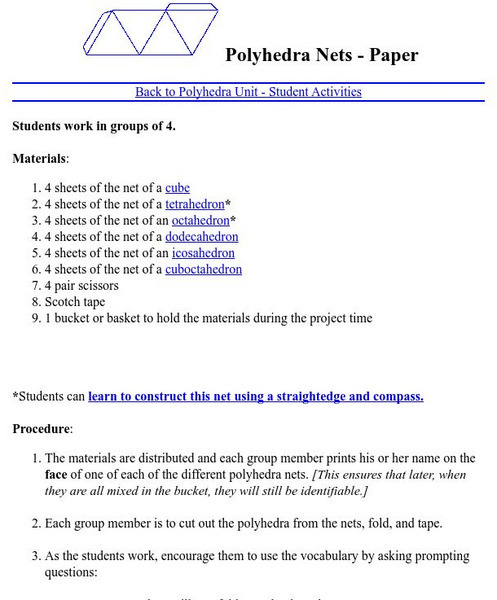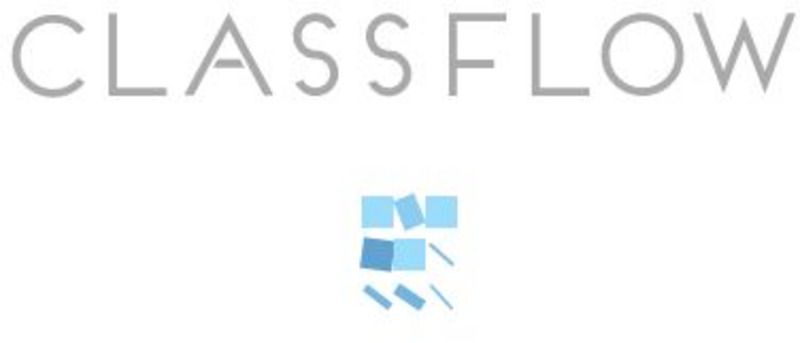Curated OER
Wacky Water Critters
Students visit a local creek or stream. They collect water samples from the creek and observe and sort the "water critters" they find in the sample, observing smaller organisms under a microscope if necessary. They identify each organism...
Curated OER
Geometry Journal: Classifying Solids
In this geometry worksheet, 10th graders respond to journal prompts related to prisms and classifying solid shapes. The two page worksheet contains nine questions. Answers are included.
Curated OER
Geometric Solids
Students identify and create simple geometric shapes and describe simple spatial relationships. Through discussion, hands-on activities and show and tell, they identify geometric solids in real life and create graphs of commonly found...
Curated OER
Cooking Vocabulary
For this cooking vocabulary worksheet, 3rd graders match up fourteen cooking terms with their appropriate definitions for English mastery if cooking terms.
Curated OER
The Water Cycle
Second graders use the program HyperStudio to draw and describe the water cycle. In this science and technology lesson plan, 2nd graders will first become familiar with the water cycle by exploring books and websites in the classroom....
Curated OER
Context Clues
In this context clues activity, students read the sentences and choose the best meaning of the underlined word. Students complete 10 online questions.
Curated OER
Chances Are: Talking Probability
Students explore probability and the process of data analysis and predictions. They participate in two activities, one involving a calculator and one the Internet, in which they make predictions and conduct activities to test their...
Curated OER
Big Foot
Students measure the length of their feet and shoes using nonstandard measurements. They check their estimates and record theirmeasurements on a paper.
Curated OER
How Clouds and Fog are Formed
Students experiment with hot and cold water, and ice, to examine how both clouds and fog are formed. Students observe and record results, and report their findings to classmates.
Curated OER
Into the Pond
Seventh graders use a pond to explore macroinvertebrates and other organisms. They use a dichotomous key to classify the organisms and maintain a journal recording their findings.
Curated OER
Do Human Practices Affect Water Quality?
Pupils determine if human practices have any noticeable effects on the quality of stream life as measured by the presence of certain macroinvertebrates. They collect, preserve and identify macroinvertibrate samples and quantify the data.
Curated OER
Surface Area and Volume of a Cylinder
Seventh graders find the surface area and volume of a cylinder. In this area and volume lesson, 7th graders complete several activities to learn the volume and surface area of cylinders.
National Council of Teachers of Mathematics
Nctm: Illuminations: Cube Nets
Interactive site where students find which nets are able to form a cube.
National Council of Teachers of Mathematics
Nctm: Illuminations: Cube Nets
This applet allows you to examine various two-dimensional figures to determine which ones can be folded into a cube.
Better Lesson
Better Lesson: 3 D Figures and Nets
Sixth graders explore cube nets in an effort to understand what properties are common to all nets that form a cube. Students work hands-on with nets and are then pushed to use their experience to visually determine whether other nets...
University of Cambridge
University of Cambridge: Nrich: Instant Insanity
Excellent interactive challenge working with cube nets to stack them in a specific order. Manipulate the cubes online to solve the problem.
Other
Calculator.net: Volume Calculator
Use these calculator tools to find the volume, in your choice of units, of a sphere, cone, cube, cylinder, rectangular prism, capsule, ball cap, conical frustum, ellipsoid, or square pyramid. Includes a reference section listing formulas...
Other
Calculator.net: Surface Area Calculator
Use these calculator tools to find the surface area, in your choice of units, of a sphere, cone, cube, cylinder, rectangular prism, capsule, ball cap, conical frustum, ellipsoid, or square pyramid. Includes a reference section listing...
SEN Teacher
Sen Teacher: Nets
Generate different "nets" for paper construction of common three-dimensional shapes: cube, cuboid, pyramid, cone, tetrahedron, cylinder, octahedron, rhombic prism, dodecahedron, pentagonal prism, and pentagonal prism.
National Council of Teachers of Mathematics
Nctm: Illuminations: Cubes
Use this applet to determine the volume of a box by filling it with cubes, rows of cubes, or layers of cubes. Determine the surface area as well by using the box's net.
National Council of Teachers of Mathematics
The Math Forum: Polyhedra Nets Paper
Contains six examples of polyhedra nets (cube, tetrahedron, octahedron, dodecahedron, icosahedron, cubosctahedron).
Other
West Contra Costa Usd: Volume: A Foundation in Unit Cubes [Pdf]
A very detailed instructional activity on determining the volume of rectangular prisms, teaching students how to derive the formula for volume, and to use it successfully. Plenty of examples, student work, and assessment options.
Alabama Learning Exchange
Alex: What's in a Box?
The class has been contracted to work for a box factory. They are to make cube shaped jewelry boxes. Students determine how many different nets are possible and then analyze the resulting cubes. This real-world situation helps to develop...
ClassFlow
Class Flow: Nets
[Free Registration/Login Required] In this flipchart, students explore geometric sense by interacting with plane diagrams that create a three-dimensional shape.


